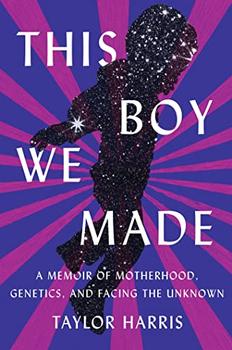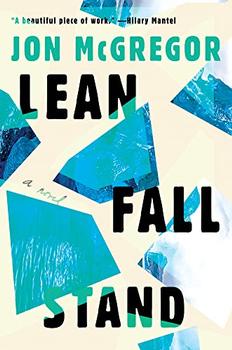Summary | Excerpt | Reading Guide | Reviews | Beyond the book | Read-Alikes | Genres & Themes | Author Bio

A Memoir of Love, Faith, and Resilience
by Allison PatakiErnest Hemingway wrote that we are "strong at the broken places," and Allison Pataki found that to be true when her husband, David Levy, a third-year orthopedic surgery resident at Rush University in Chicago, had a near-fatal stroke at age 30. On June 9, 2015, Dave and five-months-pregnant Allison were on a flight from Chicago to Hawaii for their "babymoon," planning to stop in Seattle to visit Dave's brothers. But they never made it there. On the plane Dave told her he couldn't see out of his right eye. He had an extremely dilated pupil and she asked right away if he might be having a stroke. The plane made an emergency landing in Fargo, North Dakota and Dave was rushed to a hospital for testing. Doctors found he had suffered a bithalamic midbrain ischemic stroke, even though he'd had no risk factors and this stroke type was virtually unknown in patients of his age (See Beyond the Book).
Pataki goes back and forth between the details of this health crisis and her past with Dave: how they met in their freshman year at Yale, her time working in journalism in New York City, their wedding, learning that they were going to become parents, and so on. The alternating chapters create a good pace – although I was occasionally impatient to get back to the aftermath of the stroke – and balance out the fear and confusion of that summer with nostalgia for earlier, carefree days.
Along with these two narrative streams, each moving chronologically towards the present day, the book includes fragments from some of the letters Pataki wrote to Dave every night. Especially in the first days after the stroke, when she didn't know if he would survive, let alone live a normal life again, these letters are raw outpourings of grief and worry. Although they function more like diary entries, they are addressed directly to Dave and form a record of his experiences. Because "he could no longer make new memories. Or remember the old ones," she felt she had to do all the remembering for him. Months later, after he'd been through physical and speech therapy, he could hear her stories of what had happened and say, "Gosh, I've been through a lot."
It was determined that a congenital hole in the heart and a blood clot in the leg together led to Dave's stroke. Despite his initial coma and amnesia, doctors were confident that, thanks to the brain's plasticity, he would make a full recovery. However, progress was slow and often interrupted by setbacks; "glimmers of Dave's personality were beginning to emerge, but a lot of the time he basically seemed like an intoxicated or juvenile caricature of his former self."
To keep from despairing about how much had been lost, Pataki relied on her faith. "Lean on God" was her mother's advice, and Pataki frequently mentions how prayers, hymns, and guardian angels came to her aid. It's possible such religious talk will alienate a few readers, but more likely those who have been through comparable situations will recognize the impulse to turn to anything that helps, especially a force larger than oneself.
Pataki is the author of four previous historical novels. (If her last name sounds familiar, it's because her father, George, was the governor of New York between 1995 and 2006 and ran for president in 2016.) She has good control of her story lines in this memoir, and successfully recreates the swirl of emotions she felt after Dave's stroke and the birth of their daughter, Lilly. However, she doesn't completely avoid clichés: there are a few instances each of "ups and downs" and "new normal." I also found her descriptions of Dave to be implausibly glowing. She says "There is no guile in him...he's so honest and pure and genuine" and writes in an email update to friends and family, "Dave is the strongest, most hardworking, most determined person I know." Obviously you're not going to criticize a man who's near death, but at times I felt like she was talking about a hero or a saint rather than a regular man.
There are videos out there of Dave's public appearances with Pataki. He also gets the last word: Responding to a letter his wife wrote a year after the stroke, he reflects on all that's happened and the joy Lilly, to whom the book is dedicated, has brought them during the grueling days of his recovery. It's inspiring to see how far he's come in a year, and sobering to think he might not have made it at all. What I most appreciated, though, was Pataki's insistence that she was never especially strong or brave; she just dealt with these circumstances because she had no choice. Hers is a relatable story of surviving the worst life can throw at you and finding the beauty in it.
![]() This review was originally published in The BookBrowse Review in July 2018, and has been updated for the
June 2019 edition.
Click here to go to this issue.
This review was originally published in The BookBrowse Review in July 2018, and has been updated for the
June 2019 edition.
Click here to go to this issue.

If you liked Beauty in the Broken Places, try these:

by Taylor Harris
Published 2023
A Black mother bumps up against the limits of everything she thought she believed - about science and medicine, about motherhood, and about her faith - in search of the truth about her son.

by Jon McGregor
Published 2022
A thrilling and propulsive novel of an Antarctica expedition gone wrong and its far-reaching consequences for the explorers and their families "leaves the reader moved and subtly changed, as if she had become part of the story" (Hilary Mantel).
Your guide toexceptional books
BookBrowse seeks out and recommends the best in contemporary fiction and nonfiction—books that not only engage and entertain but also deepen our understanding of ourselves and the world around us.